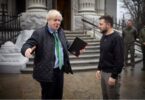Mike Head
On the eve of this week’s G7 and NATO summits in Europe, Prime Minister Scott Morrison and Defence Minister Peter Dutton sharply escalated Australia’s role as an attack dog for Washington, in its increasingly aggressive economic and military offensive against China.
On his way to join the European gatherings, Morrison delivered a speech in Perth, in which he aligned himself lockstep behind US President Joe Biden’s demand at the summits for an alliance of the supposed “free world”—the major imperialist powers—against Beijing.
As if outlining the program for another world war, Morrison declared “great power strategic competition” to be “the defining issue” for “global and regional stability, upon which our security, our prosperity and our way of life depends.” The Indo-Pacific region was “the epicentre” of this “renewed” historic conflict.
Provocatively, Morrison again accused China of “heightened economic coercion,” even though it is Australia, in partnership with the US, that has systematically imposed punitive measures against China, including virtually blanket investment bans and a bar on the telecommunications equipment provider, Huawei. This charge was accompanied by a long list of allegations, which included “rapid military modernisation,” “undermining of international law,” “enhanced disinformation, foreign interference and cyber threats.”
Last year, Morrison stridently championed the Trump administration’s unfounded accusations that China was responsible for the global COVID-19 disaster, despite scientific evidence that the virus did not come from a Wuhan lab. Now Morrison has said he “strongly supports” Biden’s demand for a further inquiry into these claims, with “enhanced surveillance” powers.
Morrison’s line up behind Biden on the Wuhan lab conspiracy allegations epitomised the Australian prime minister’s switch from personally and politically identifying himself with Trump, to backing Biden’s rapid intensification of the confrontation with China. Back in October 2019, Morrison railed against “negative globalism,” echoing Trump’s “America First” demagogy. He was feted with a state dinner at the White House, and appeared alongside Trump at a campaign rally in Ohio. Now, he is backing Biden’s calls for stronger action against China via Western-dominated institutions such as the World Trade Organisation.
In other words, Morrison did everything he could to support Biden’s shift from Trump’s unilateralism, to demanding that all the major rivals to the US, notably the European and Japanese powers, line up against China to ensure that the US “wins the 21st century”—that is, reasserts the global hegemony it secured via World War II.
The common thread is the Australian ruling elite’s reliance on US imperialism since that war, both in terms of military backing and foreign investment, and its willingness to act as a frontrunner for Washington’s demands.
Echoing Biden, Morrison called for an alliance to uphold “a liberal, rules-based order, that has benefitted us for so long.” This “order” consists of the international economic and financial arrangements, based on the US dollar, that were put in place by the US and its allies after that catastrophic war. For all the talk of “freedom” and “democracy,” the US is accelerating preparations for war against China. Dutton, giving his first public speech since taking over as defence minister in March, provided a further indication of this.
Dutton declared that he anticipated more US troops joining the current annual six-month basing of 2,500 US marines, near the strategic northern city of Darwin, and the hosting of more US warships at the key Australian Indian Ocean naval base near Perth.
The US is exploring options for dispersing its forces in the Indo-Pacific because several major bases, such as those in Japan and Guam, are in range of Chinese weapons. US Defence Secretary Lloyd Austin this week ordered Pentagon chiefs to “revitalise” relations with America’s network of allies, after a classified report into the military challenge China poses.
“There is clearly an opportunity for Australia to do more, given our geographic location in terms of troop movements,” Dutton said. He gave “credit” to the previous Labor Party government of Julia Gillard, for agreeing with the Obama administration in 2011 to the stationing of US marines.
Dutton refused to specify the timing, composition or numbers of US personnel potentially involved, but pointed to his government’s plan to spend almost $8 billion on upgrading Northern Territory military bases and training areas to enhance US access.
Dutton also accused Beijing of already conducting “grey-zone tactics,” which he said were designed to “intimidate or injure a country” without resorting to armed conflict.
During the week, Dutton and Foreign Minister Marise Payne conducted virtual meetings with their German and Japanese counterparts, issuing strident communiqués accusing China of aggression and pledging to intensify their joint actions against Beijing.
Another indication of the pace and provocative nature of the US-led war preparations came from Western Australian Labor state Premier Mark McGowan. After listening to Morrison’s speech in Perth, and holding a private meeting with him, McGowan accused the federal Liberal-National Coalition government of “madness.” “All this language I see coming out of the Commonwealth government, about us going to war with China, I have never heard something so insane in my life,” McGowan said. He described “the idea that somehow we should be promoting armed conflict with a superpower,” as “absolute madness” and “absolutely off the planet.”
McGowan voiced the alarm of sections of the Australian ruling class that depend heavily on exports to China, particularly the Western Australian-based iron ore and liquefied natural gas producers.
The value of goods exported to China was 20 times the value of the goods imported from China, McGowan said. “I’m the premier of the state that actually carries the nation’s economy,” he said, “particularly when iron ore is over $200 a tonne.” Losing that relationship with China by being “the tip of the spear in taking up trade issues” would be “absolutely catastrophic” for Australia.
As well as the consequences for multi-billion dollar profits, McGowan’s nervousness reflects fear that the government’s blatant statements and actions against China will trigger the underlying popular opposition, including among workers and youth, to such a disastrous conflict, that would almost certainly be fought with nuclear weapons. This anti-war sentiment and hostility to US militarism, which developed during the Vietnam War, was deepened by the criminal invasions and occupations of Afghanistan and Iraq, based on the lies and fabrications of the “war on terrorism” and “weapons of mass destruction.”
But the Labor Party and its affiliated trade unions, whom McGowan represents, are no less committed than the Liberal-National Coalition to the US military alliance and Washington’s offensive against China. At this year’s Labor Party national conference, the party and union officials reaffirmed that commitment, and passed six resolutions denouncing China.
Moreover, the “madness” of which McGowan complains, is the insanity of the capitalist profit system itself. Its division of the world into nation-states, based on rival ruling elites, each fighting for plunder and supremacy, has already plunged the globe into two world wars in the last century. The only force that can prevent an even-greater calamity, with human civilisation itself threatened by a nuclear holocaust, is the international working class, whose interests lie in unifying its struggles on every continent against the “insane” capitalist class in order to overthrow the private profit, nation-state system. McGowan and the Labor and union apparatuses are utterly opposed to this essential socialist perspective. Instead, as McGowan’s reference to the damage to the “nation’s economy” typifies, they are totally wedded to the defence of the interests of their “own” Australian ruling class.






